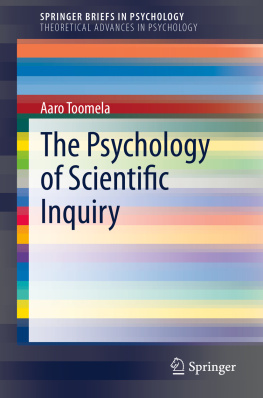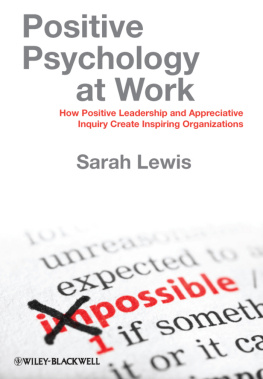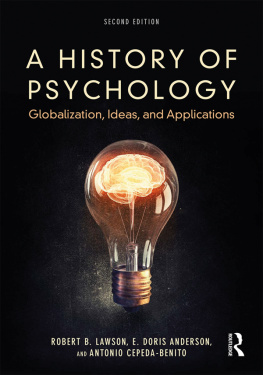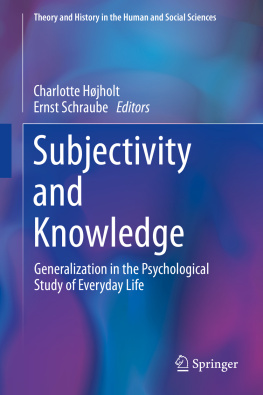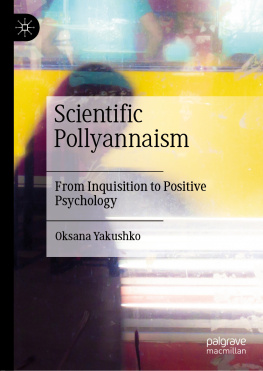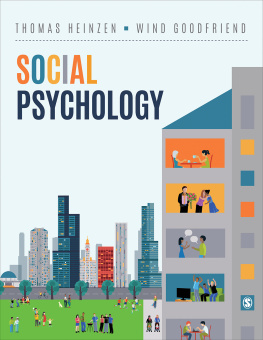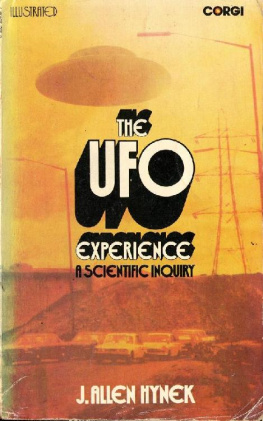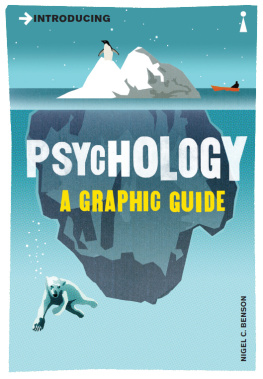Aaro Toomela - The Psychology of Scientific Inquiry
Here you can read online Aaro Toomela - The Psychology of Scientific Inquiry full text of the book (entire story) in english for free. Download pdf and epub, get meaning, cover and reviews about this ebook. year: 2019, publisher: Springer International Publishing, genre: Romance novel. Description of the work, (preface) as well as reviews are available. Best literature library LitArk.com created for fans of good reading and offers a wide selection of genres:
Romance novel
Science fiction
Adventure
Detective
Science
History
Home and family
Prose
Art
Politics
Computer
Non-fiction
Religion
Business
Children
Humor
Choose a favorite category and find really read worthwhile books. Enjoy immersion in the world of imagination, feel the emotions of the characters or learn something new for yourself, make an fascinating discovery.
- Book:The Psychology of Scientific Inquiry
- Author:
- Publisher:Springer International Publishing
- Genre:
- Year:2019
- Rating:4 / 5
- Favourites:Add to favourites
- Your mark:
- 80
- 1
- 2
- 3
- 4
- 5
The Psychology of Scientific Inquiry: summary, description and annotation
We offer to read an annotation, description, summary or preface (depends on what the author of the book "The Psychology of Scientific Inquiry" wrote himself). If you haven't found the necessary information about the book — write in the comments, we will try to find it.
The Psychology of Scientific Inquiry — read online for free the complete book (whole text) full work
Below is the text of the book, divided by pages. System saving the place of the last page read, allows you to conveniently read the book "The Psychology of Scientific Inquiry" online for free, without having to search again every time where you left off. Put a bookmark, and you can go to the page where you finished reading at any time.
Font size:
Interval:
Bookmark:
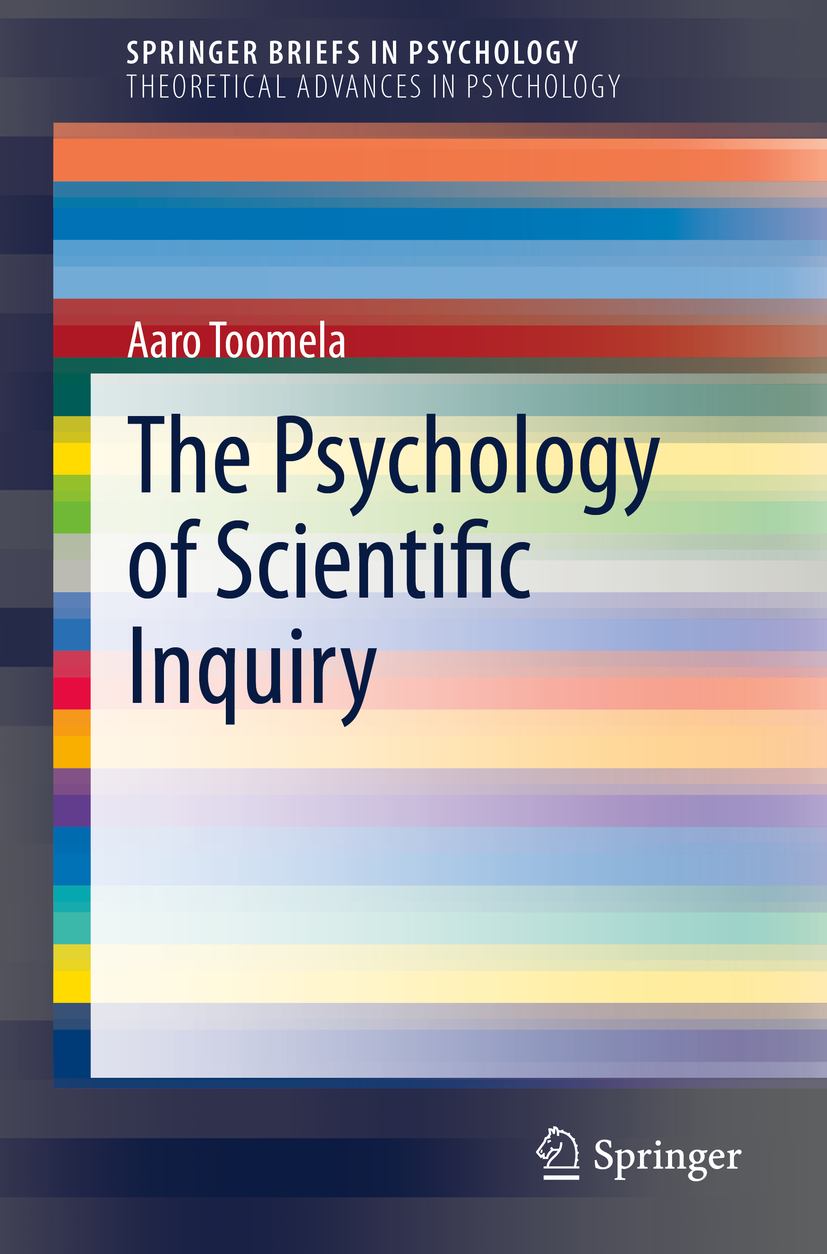
SpringerBriefs in Theoretical Advances in Psychology will be an extension from the currently renovated Annals of Theoretical Psychology in the direction of bringing short, single (or multiple) authored theoretical advancements across all areas of psychology to the international audience. The focus is on the development of innovative theoretical approaches and their discussion. The Series will have a clearly defined international and interdisciplinary focuseven if it remains within the discipline of psychology.
Featuring compact volumes of 100115 pages, each Brief in the Series is meant to provide a clear, visible, and multi-sided recognition of the theoretical efforts of scholars around the world. It is targeted to researchers, graduate students, and professionals in Post-BA level psychology, education, anthropology, and sociology.
Briefs are published as part of the Springers eBook collection, with millions of users worldwide. In addition, Briefs are available for individual print and electronic purchase.
More information about this series at http://www.springer.com/series/14346

This Springer imprint is published by the registered company Springer Nature Switzerland AG
The registered company address is: Gewerbestrasse 11, 6330 Cham, Switzerland
In the twenty-first century, we live under the conditions of exponential increase of information that at times breaks loose from the knowledge it is supposed to represent. This is the case of information noise too much information that obscures the basic message that is needed for our understanding of the World. Psychology today is filled with information noiseempirical studies are published in ever-increasing quantity with rare efforts to systematically analyze what the value of these messagesother than the fact that they are published in peer-reviewed journalsactually is. Science is in danger when fetishism of the administrative evaluation systems of scientists work steps in.
This book by Aaro Toomela is a powerful counter-voice to the prevailing ethos of empiricism for its own sake. It is a systematic analysis of the ways in which psychologists thinkorshould think if they want to advance their science to that of productive Wissenschaft . His coverage of the issues is typically Estoniandeep in ideas, serious in their implications, and silently humorous in their presentation. Estonia is a small country between Europe and the Orient, where people are serious about many aspects of livingincluding that of how classical music can be appreciated in its new forms yet fiercely independent new nation state.
Aaro Toomelas work in psychology belongs in kind to these basic inventions that Estonia has contributed to the World. He is a unique scholarcombining in his background the education and practice of a medical doctor with that of a cultural psychologist. Currentlyas a professor of both neuropsychology and cultural psychology in Tallinn Universitya combination of topics within one Lehrstuhl that is unique in the World. He is among the top three persons in the World who is an expert in the work of Lev Vygotsky and Alexander Luria. Much of the theoretical advancement he presents in this book is based on this expertise that dates back to last century.
There is much to learn from the Continental European perspectives in psychology of the 1920s and early 1930s, and Toomelas work is a good example of how history of psychology can illuminate the future of the discipline. History is not a cabinet of curiosities for old ideas, but rather a reservoir of unfinished and unduly abandoned perspectives many of which can lead us further in our search for theoretical innovations in the twenty-first century. Many of the forgotten names of the European psychology before 1879when Wilhelm Wundts establishment of the first laboratory of psychology has been made to mark the birth of psychology as scienceare worth careful re-examination. Psychology is the science of the extraordinary ways in which we live our ordinary lives and is better not dragged over to a laboratory for investigations. Psychologists such as William Shakespeare, Johann Wolfgang von Goethe, Fyodor Dostoyevsky, Ivan Bunin, Henry James, Rabindranath Tagore, Pablo Neruda, and many others have made that point clearyet mostly in the domain of applied psychology appreciating the world literature rather than in research psychology. Yet the latter could benefit from it in very realistic ways (Brinkmann, 2009). Psychological issues are oneand complexwithin laboratory walls and beyond them.
Toomela understands the basic human value of doing psychology with deep devotion to our basic understanding. He is relentless in pointing out the superficial moments in psychologists ways of working. He is known for his intelligently argumentative style that has already been contributing to the present series of SpringerBriefs (Toomela, 2017, 2018), aside from in the analysis of psychologys methodological crisis (Toomela & Valsiner, 2010). That psychology in the last century has moved in a direction of fragmentation of ideas and mechanistic application of methods is a point Toomela never tires of emphasizing. At times, helike most of usgets frustrated as the possible ways of overcoming the crisis are ignored by the readers.
Advocating against the fragmentation of the discipline, Toomela argues that there are specific epistemological and ontological assumptions that good science should satisfy. Psychology would be still on its way to becoming such an integrative scienceToomela calls this stage metaparadigmatic science. His aim is to set the epistemological foundations for a metaparadigmatic psychology. According to him, this advance will be possible insofar as the discipline overcomes the narrow understanding of causality that pervades it. Contemporary psychology would reduce cause to efficient cause, leaving important parts of the psychological object/subject
Font size:
Interval:
Bookmark:
Similar books «The Psychology of Scientific Inquiry»
Look at similar books to The Psychology of Scientific Inquiry. We have selected literature similar in name and meaning in the hope of providing readers with more options to find new, interesting, not yet read works.
Discussion, reviews of the book The Psychology of Scientific Inquiry and just readers' own opinions. Leave your comments, write what you think about the work, its meaning or the main characters. Specify what exactly you liked and what you didn't like, and why you think so.

